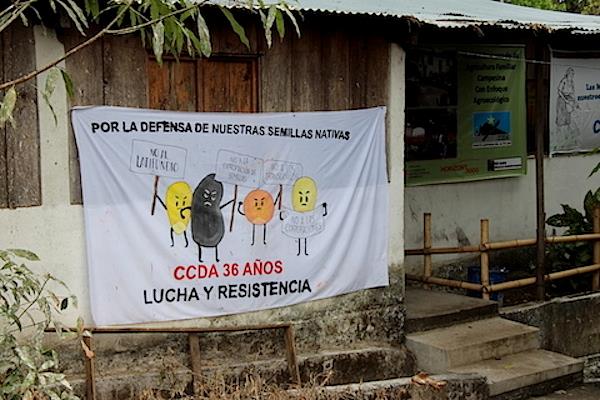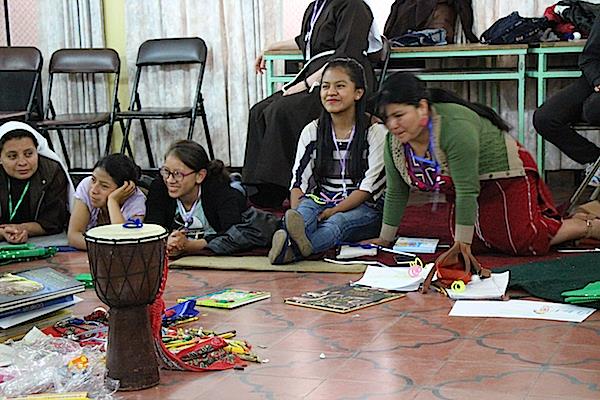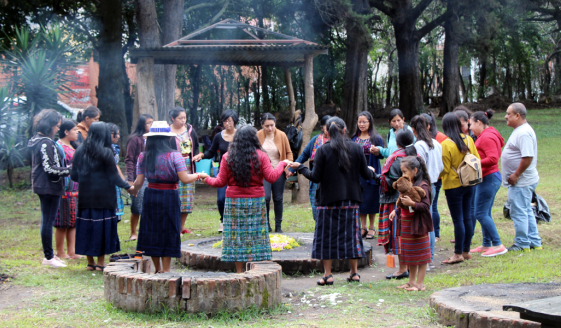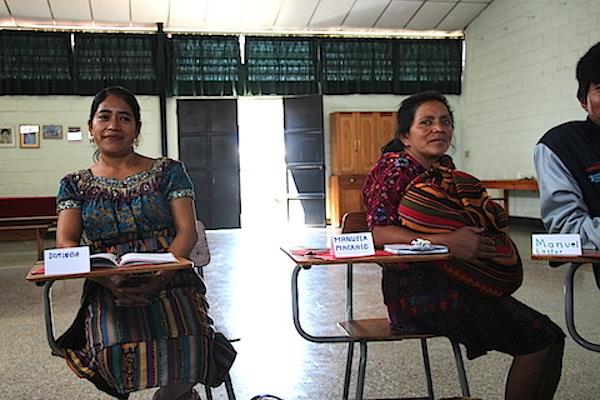Make Your Experiences Count. They Can Change the World.
LET’S BRING ALL OF OUR KNOWLEDGE AND EXPERIENCES TOGETHER.
TOGETHER WE KNOW MORE. TOGETHER WE ACHIEVE MORE. TOGETHER WE DO BETTER.
LET’S BRING ALL OF OUR KNOWLEDGE AND EXPERIENCES TOGETHER.
TOGETHER WE KNOW MORE. TOGETHER WE ACHIEVE MORE. TOGETHER WE DO BETTER.
Published: August 5, 2019
“Healing, Leadership and Agriculture for a Fair and Decent Life” – that is what brought four of our Partner Organisations in Guatemala – the Asociación MIRIAM, the Colectivo NO’j, the Comité Campesino del Altiplano (CCDA) and the Pastoral Social, Diócesis de Quiché (PSQ) – to pair up and go through the process of a joint systematisation of their successful projects and four corresponding good practices, which we are going to present in this article. The systematisation was carried out in the last period of the 2016-2018 Cofinancing Framework Programme with the ADA (Austrian Development Agency).

The method that they have applied for the systematisation is defined as inclusive and participatory.
“The systematisation is a participatory and creative process that allows us to reconstruct and interpret experiences of organisation and development, with their successes and blunders, their challenges and findings for their prevalence in time. Besides, it is a useful tool to build new knowledge and new ideas and to start new processes of redifining the common cultural patterns of a group or community regarding various issues that concern them: health, education, gender equity, ecological production, art, among other crucial aspects of daily life”, this is how these Partner Organisations understand the concept of systematisation.
According to the consultancy’s ToR for facilitating the systematisation process, the objectives can be described as follows:

In order to achieve these goals they counted with the commitment of all the participants. That’s the reason why training, reflection and debate among the involved persons were fundamental.
The reason why the Partner Organisations chose to work in their projects with a focus on gender and ethnicity (fundamental in a country like Guatemala) relates back to the social differences that still remain within the Guatemalan context.
The gender focus allowed them to “analyse the power relations between women and men, to identify the gender gaps that still prevail and to come up with mechanisms that contribute to reduce them.” The women’s interests and proposals represent a priority, as the constitute the group that faces the majority of disadvantages.
Because of the focus on ethnicity they were able to analyse power relations between the mestiza population and indigenous communities and to identify historical disadvantages that indigenous people face – above all women. Consequently, it was necessary to take intersectionality into account regarding the indigenous women and to develop strategies in order to promote equal relationships.

Since all of the systematisations steps correspond to a participatory methodology, they were able to count on the participant’s opinions, experiences and contributions. The educational character of the entire process helped to foster critical thinking and to promote the exchange of knowledge and experiences. The subjectivities and emotions involved in experiences were applied in order to “leverage learnings that can enrich future processes.”
With the support of three selected techniques – in-depth interviews, discussion groups and participatory workshops – they managed to create an atmosphere of confidence and complicity, essential for facilitating critical review, freedom of expression and the drafting of creative proposals.

Regarding the systematisation’s definition, they chose one good practice example for each project that we are going to feature below. Keep reading to find out more about them.
In the following paragraphs you will get to know the content of the four mentioned good practices:
Note: The linked documents as well as the featured videos are only available in Spanish.
The Asociación MIRIAM for the intellectual promotion of Maya, Garífuna, Xinka and Mestiza women is headed by indigenous women. It is build on a Maya worldview and against discrimination based on culture, linguistic communities, nationality, age, (dis)abilities, political, religious and/or sexual orientation. Their overall goal is to promote a full life for women free from violence and racism.
Their main topics are the access to education, women empowerment, equal participation, healing, restoration of rights for young people and women survivors of violence and the right to transformative healing.
In order to get to know the results, conclusions and recommendations of the systematisation of their good practice titled “The Impact of Gender Graduates on Indigenous Women’s Empowerment” click here:
Check out the video that resulted as additional material from the systematisation and get to know more about the women of MIRIAM:
The initial objective of the Colectivo No’j “was to increase the knowledge and to leverage the creative skills of the young people and trainers in different areas of the Quetzaltenango education that has expanded to other regions and countries.” With this systematisation they aimed to “contribute to the youth leadership’s impact facing authorities and the society in general for the creation of opportunities for the Guatamalan youth.”
The good practice they chose for the systematisation involve the Educational Festivals for Life, where 26 participants, volunteers, workshop facilitators and technical staff worked together.
Discover their lessons learned, conclusions, recommendations and all of the project’s and the systematisation’s details by clicking here:
They have also produced a testimonial video in addition to the systematisation. Watch it here:
This project is divided into two components: one from the Comité Campesino del Altiplano (CCDA) and one from the Pastoral Social, Diócesis de Quiché (PSQ).
First, we will focus on the component from CCDA. “[CCDA] is an inclusive organisation that promotes the integral development of the population, above all of indigenous communities and farmers, taking a great amount of actions regarding education, agriculture, organisation etc. One of CCDA’s key strategies in order to guarantee food sovereignty, make poverty and extrem inequality history is to provide access to land and generate productive projects with the required technical and financial assistance.”
Based on that they have introduced the “Graduates in Agroecology” or the “People’s Farming School for Agroecology”.
If you want to see all of the details of this project and its systematisation, the lessons learned, conlusions and recommendations, please click here:
We kindly invite you to watch the video that resulted as additional material from this experience:
Second, let’s have a look at the component the PSQ has developed. This Partner Organisation “looks back on a long history of working with farmers. Women and men of all ages constitute the target group of their project that deals with justice and well being by the example of Jesus. They strive to assist in processes of training, organisation, awareness and participation in projects that aim to raise the profile of the El Quiché rural and urban population and to improve their living conditions.”
With the help of the programme “Encounters for Exchaning Experiences from Farmer to Farmer” they pursue the goal of reinforcing family farming. These encounters raise awareness of how important it is to learn form experiences, to get together and respect one another in our diversities and to develop agricultural methods that take care of the environment.
In order to get all of the project’s and systematisation’s details, lessons learned, conclusions and recommendations click here:
Discover a different perspective of the encounters by watching the video that was created next to the systematisation:
Do you want to carry out a sistematisation of one of your projects? You can contact us by clicking here or for more information please click below: